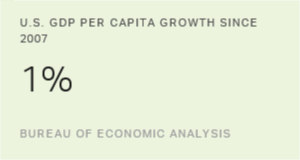Everyone knows that the United States is in a terrible business slump, and there's no shortage of opinions about how to get out of it. But there hasn't been much in the way of notable improvement. So our organizations -- Gallup and Operation HOPE -- have been looking deeply into the science of human nature to find an answer and a solution.
There is an enormous amount of economic startup energy in our kids, enough for America to re-win the world's markets.
But before getting to the science, some salient facts: In the U.S., there are 6 million small businesses, about 100,000 mid-sized companies, and only 1,000 really large enterprises. In total, they generate right around 100 million real full-time jobs and just over $15 trillion in sales and production. The problem is, this huge economic engine is stalled.
There are two reasons for this, in our view. One, business leaders aren't in a "growth" state of mind. No matter the size of the company, they have lost their will to "dream it, build it," as our friend, ad man Roy Spence, put it. Second, the country is seriously short on startup companies. We need a minimum of 2 million startups per year to keep our economy and jobs pumping, but we're running at roughly 400,000 a year. Nothing fixes America's economic problems unless the number of startups soars to new heights.
Despite what you hear incessantly during this election season, we cannot buy, tax, nor legislate our way to a sudden world-changing boom of startups. But we can mentor and intern our way to one. The future success of America's economy relies on its youth, because the spirit of free enterprise -- the same spirit that builds companies, creates jobs, and boosts economies -- is just waiting to be tapped among young people.
Kids, entrepreneurship, and the economy
But do you know if kids are financially literate enough to understand or care about business? Do you know how many want to be entrepreneurs? Do you know how many kids even know what that word means? Probably not -- the connection between kids, entrepreneurship, and the economy is a very new idea. New, but crucial -- so we measured it.
We call the program the Gallup-HOPE Index. The results give political, business, and educational leaders the numbers they need to make informed decisions. The results make it starkly clear that the relationship of kids' financial literacy to their sense of hope, overall well-being, and engagement in their schools and communities has a big impact on everyone.
We polled 70,000 kids in fifth through 12th grade and found that students who are engaged, who are on the thriving end of the well-being scale, and who are hopeful are approximately four times more likely to qualify as financially literate than disengaged, suffering, or discouraged students.
So you can make the argument that thriving, engaged, hopeful kids are the best bet for future startups. They're the ones who are capable of fostering the entrepreneurial spirit in America's future economy -- and we're capable of measuring it today.
And the prospects are very good. There are more than 50 million kids in grades K-12 in the U.S. and 30 million kids in middle and high school. A Gallup study showed that 77% of students in grades five through 12 said that they want to be their own boss, and 45% plan to start their own business. When we asked the same group if they believed they would "invent something that changes the world," 42% said "yes."
There is an enormous amount of economic startup energy in our kids, enough for America to re-win the world's markets and generate new great jobs. The kids have everything we need, but adults aren't giving them the chance to succeed.
When Gallup-HOPE asked these kids if they were currently interning with a local business, 5% said "yes." So there are about 23 million kids in an entrepreneurial state of mind, but 95% of them aren't getting the attention they need to become entrepreneurs. However, our research also shows that if we can move that 5% up to 25%, we can change the world.
Giving talented kids what they need
One more key point: 30 years of Gallup data show that when people have jobs that fit their talents and when they are engaged in their work, they are much, much happier. They are also more productive, healthier, and more economically profitable. If we give talented kids what they need to launch themselves as entrepreneurs and then show them how to be engaged and what their strengths are, we can guarantee them a happier, better life.
That's what everyone wants for their kids, of course. But this method carries the added benefit of literally saving America. And that's not an opinion -- that's a solution.
A version of this article originally appeared in The Baltimore Sun on 3 October 2012. Reprinted with permission.
